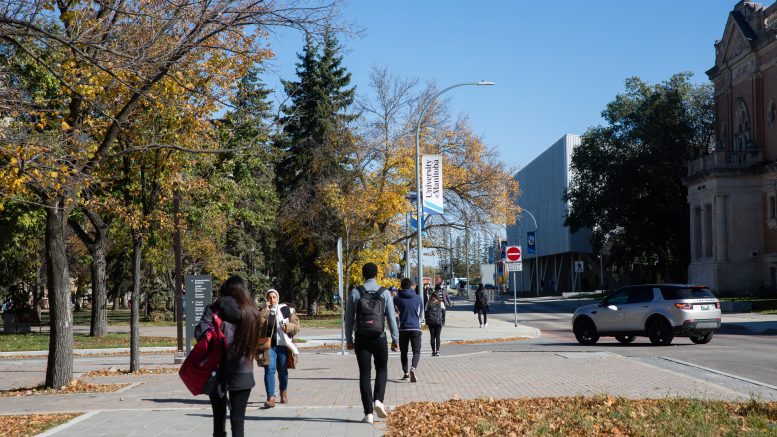The U of M has released finalized enrolment statistics for the fall term 2024 which mention a “significant decrease in the number of new international students.”
As of the official reporting date, Nov. 1, overall enrolment for the fall term was 31,334 students — marking an increase of 1.8 per cent from the previous year. Full-time enrolment increased 2.6 per cent to 26,787 from the previous year, while part-time enrolment decreased by 3.9 per cent to 3,996 students.
The fall term enrolment summary report, prepared by the office of institutional analysis, indicates a “significant shift in the makeup of the student population.” Domestic enrolment increased 3.6 per cent while international enrolment decreased by 4.5 per cent.
Self-declared Canadian Indigenous enrolment increased by 9.5 per cent to 2,994 students in the fall term. “Indigenous students currently make up 9.6 per cent of the overall student population,” according to the summary report.
Student enrolment statistics

Source: University of Manitoba’s office of of institutional analysis. Graphic by Milan Lukes.
Significant decrease of new international students
The report indicates a decline in new international students of 30.1 per cent, a decrease of 560 students to 1,303 for the fall term. International enrolment overall stands at 6,675 students as of the reporting date.
In September, the university’s president and vice-chancellor Michael Benarroch told the Manitoban that the university is anticipating a loss “somewhere in the nature of seven to nine million dollars,” following the release of a preliminary student enrolment summary. Benarroch did not rule out the possibility of a student tuition hike in the future.
New international student enrolment is down across the country following the federal government’s announcement in January 2024 to set an intake cap on international student permit applications.
The cap is expected to result in approximately 360,000 approved student permits for 2024 — a decrease of 35 per cent from the previous year — according to the federal government.
To implement the cap, effective Jan. 22, 2024, every study permit application submitted to Immigration, Refugees and Citizenship Canada (IRCC) also requires an attestation letter from a province or territory. A portion of the cap is allocated to each province and territory based on population, who will then distribute the allocation among their designated learning institutions.
Provincial attestation letters still available, intake cap not reached
In a statement from a provincial spokesperson, the federal government originally allocated 15,081 Provincial Attestation Letters (PALs) to Manitoba, which was increased to 18,652 PALs following advocacy from the province.
“As of mid-October, the Manitoba government has issued 8,008 PALs to prospective international students applying for study permits to attend universities and colleges in Manitoba,” read the statement.
The Manitoba government has allocated 6,540 PALs to the U of M and 2,000 PALs to the International College of Manitoba (ICM) in 2024, according to the statement. The ICM offers a direct path for international students into post-secondary studies.
As of Oct. 16, the U of M has accessed 2,513 PALs and the ICM has accessed 847 PALs — less than half of the PALs allocated for 2024.
When questioned why the university had not fully accessed all of their allocated PALs, Greg Smith, the university’s vice-provost (academic planning and programs) stated that changes introduced by IRCC in January 2024 resulted in “a lot of uncertainty for many international students.
“[The changes] placed a significant challenge on UM, other post-secondary institutions and potential international students considering studies in Canada and here in Manitoba,” stated Smith.
“Changes included doubling of the proof of funds amount a potential student needs to have beyond their first-year tuition, which increased from $10,000 to $20,635, freezing the permit processing for several weeks and changes made to the post-graduate work permit regulations.”
Smith stated that international students either deferred their applications or looked at their next choice for institutions in other international markets. He added that the university will continue to offer remaining PALs to all eligible applications that are applying for 2025.
Canada’s intake cap on international student permit applications is set to remain in place until 2026.



